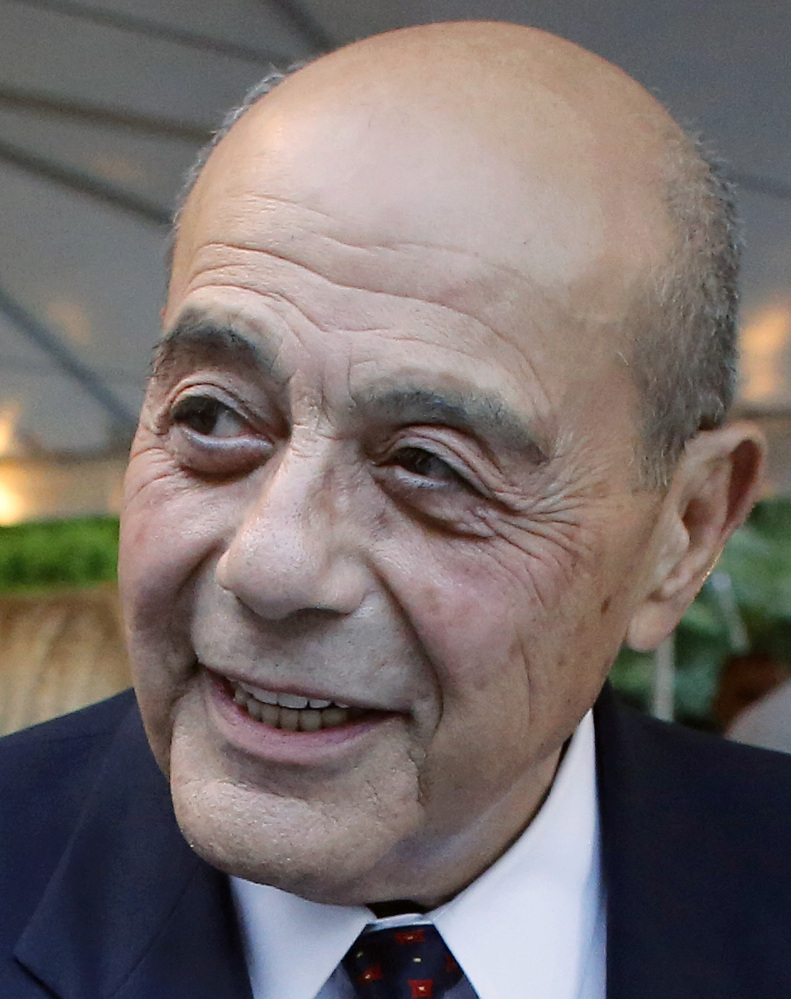PROVIDENCE, R.I. — Depending on whom you ask, Buddy Cianci is either a visionary who transformed the city of Providence during 21 years as mayor or a corrupt bully whose two felony convictions and prison stint make him an embarrassment.
Cianci’s legacy is a central question as he mounts his second comeback bid for mayor 12 years after he was sent to prison for running the city as a criminal enterprise.
He says his mark can be seen in riverside parks, a robust arts scene and a behemoth shopping mall. Others see a city still recovering from Cianci’s decisions to hand out goodies to political supporters while mercilessly retaliating against enemies.
Cianci, now 73, has said his finest achievement was in making residents proud of where they come from, but others see a city shamed by his actions: His 1984 assault conviction forced him from office but his successful 1990 comeback – on the slogan “He never stopped caring about Providence” – ended with a conviction of racketeering conspiracy in 2002.
“He stained the city with corruption, and governed in a uniquely vengeful, vindictive style,” said U.S. Sen. Sheldon Whitehouse, who was U.S. attorney at the start of the criminal investigation that ultimately brought Cianci down. “He’s a master at the art of taking credit for other people’s work.”
Cianci’s Republican opponent, Daniel Harrop, a psychiatrist, has compared the city to a battered spouse who keeps returning to the abuser. Cianci, an independent, also faces Democrat Jorge Elorza, a law professor and former judge, in the Nov. 4 election.
A recent Cianci campaign ad shows old photos of Providence with run-down buildings and parking lots covering rivers that today flow through public parks.
“In 1974, this was the city of Providence,” the narrator says. “Many people today wouldn’t recognize it. Then a new mayor was elected, and that mayor’s leadership changed everything. That mayor was Buddy Cianci.”
The ad then shows images of some of the projects Cianci touts: a performing arts center, a skating rink, a shopping mall.
Francis J. Leazes Jr., a professor at Rhode Island College and co-author of the book, “Providence, The Renaissance City,” said Cianci can claim credit for some of those things. Cianci recognized the importance of culture and historic preservation, Leazes said, and he pushed through many smaller projects.
But on big projects, such as moving rivers and train tracks to remake downtown, Leazes said many others made those happen.
“Those were the creation of other people,” Leazes said. “He would get on board.”
Cianci, who declined to be interviewed, raised the city’s profile nationally by sheer force of personality. He was a fixture on national TV and is still a media favorite for his never-ending one-liners. His celebrity only grew after he was re-elected after his first felony, and ranks along with Washington’s Marion Barry as one of the most notorious mayors in history. But unlike Barry, who mounted a comeback after being caught on video smoking crack cocaine, Cianci has two felonies under his belt.
Cianci even hawks his own pasta sauce, once arranging to have it put on display in the window of Cartier on Fifth Avenue in New York. His toupee became a trademark, although he returned to the city after prison without his “squirrel.”
“That’s his real skill, to make people feel good about where they live,” said Marc Genest, a former political science professor at the University of Rhode Island, who says Cianci’s campaign is “a redemption tour” because he sees his legacy as incomplete.
Current Mayor Angel Taveras, a Democrat who did not run for re-election and who is supporting Elorza, says there’s little good in Cianci’s legacy. He called the national attention on the race “essentially a train wreck that people are stopping to look at.”
Some blame Cianci for problems that still linger, most notably a massive pension burden so bad that Harrop, the Republican candidate, is running on a platform of putting the city into receivership or bankruptcy.
Cianci agreed to give annual compounded cost of living increases of 5 and 6 percent to some city workers, and failed to put in enough to pay for pension promises, Taveras said. One city pensioner receives $16,000 per month, tax free.
Cianci maintains he had a plan to get enough money into the system before he left office 12 years ago and blames others for the financial problems.
In his 2011 memoir, Cianci said, “I used my public power for personal reasons. I admit it,” he wrote. “It probably wasn’t the right thing to do, but it certainly felt good.”
Copy the Story LinkSend questions/comments to the editors.



Success. Please wait for the page to reload. If the page does not reload within 5 seconds, please refresh the page.
Enter your email and password to access comments.
Hi, to comment on stories you must . This profile is in addition to your subscription and website login.
Already have a commenting profile? .
Invalid username/password.
Please check your email to confirm and complete your registration.
Only subscribers are eligible to post comments. Please subscribe or login first for digital access. Here’s why.
Use the form below to reset your password. When you've submitted your account email, we will send an email with a reset code.